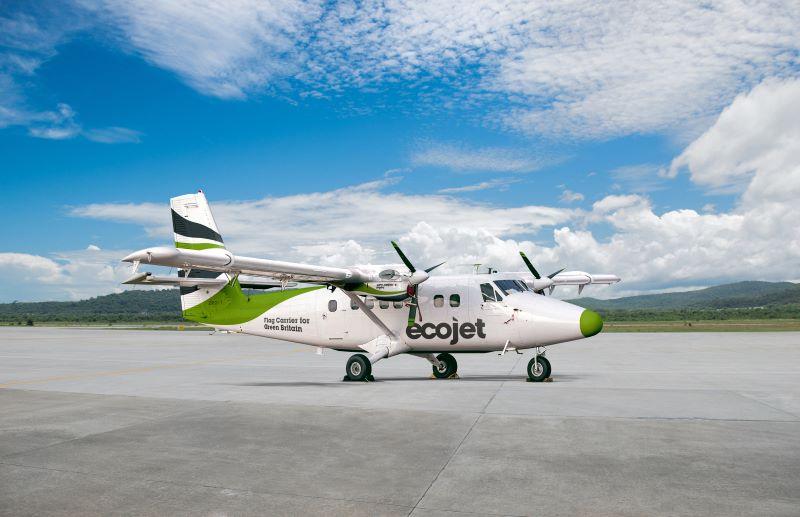
Dale Vince, the founder of renewable energy firm Ecotricity, is planning to launch Edinburgh-based Ecojet in early 2024.
The new airline will initially use kerosene-powered De Havilland Canada DHC-6 Twin Otters, which will be converted to hydrogen-electric powertrains a year after launch.
“The plan is to operate an electric airline,” Vince told Aviation Daily. “We expect [UK] CAA certification, our license to operate, by the end of the year.”
Ecojet plans to secure a UK air operator’s certificate (AOC) using conventionally powered 19-seat Twin Otters. The startup will then launch with three or four aircraft operating UK domestic flights in early 2024, estimating that the repurposing of existing aircraft will save 90,000 tons of carbon per year. The startup’s onboard product will also have a sustainability focus, with plant-based meals, no single-use plastic use, and eco-friendly uniforms.
“We will initially burn kerosene while the [hydrogen-electric powertrain] engines that we’re going to use complete their certification program, which we expect in early 2025,” Vince said. “When that happens, we will then swap out the engines on our existing planes and migrate to being a fully electric airline, powered by renewable energy.”
Around 18 months later, Ecojet intends to add 70-seat De Havilland Canada Dash 8s. “We’ll go from a 300-mi. range initially, with our 19 seaters, to a 500-mi. range with our 70 seaters. And at that point we hope to reach Europe.”
Vince declined to identify the powertrain supplier, but the timings and aircraft types indicate that the technology provider may be ZeroAvia, which is aiming to develop a 9- to 19-seater hydrogen-electric propulsion system with a 300 nm range by 2025, followed by a 40– to 80-seater with a 1,000 nm range by 2027. ZeroAvia is working on both the Twin Otter and Q400 platforms.
Ultimately, Ecojet is planning to launch long-haul flights, however Vince said promotional images showing a Boeing 737 was just “a mock-up for fun.”
“We’re going to start out with propeller-based aircraft, and we did have quite a discussion about whether Ecojet was the right name for us, but our ambition is to be operating big aircraft as and when that becomes available,” Vince said.
Returning to the airline’s more immediate ambitions, Ecojet began its AOC process a few months ago and the airline has chosen Edinburgh to Southampton as its inaugural route. This will be joined by other large UK cities during its initial expansion phase.
Network development will also depend on which airports have the infrastructure to handle hydrogen. “It’s not a difficult issue to solve,” Vince said. “It’s just something that we will need some lead times around, for building electrolyzers, hydrogen storage, and that kind of stuff. We’ve got time to do that while we wait for the [powertrain] technology to be certified.” If necessary, Vince’s green energy company Ecotricity will build this infrastructure.
Vince is skeptical about the potential for sustainable aviation fuel (SAF), because of feedstock availability, but he is very interested in aviation e-fuels—particularly those based on direct air capture (DAC), where airborne carbon is gathered and reused. This is the same technology that Airbus and seven major airline groups backed during the 2022 Farnborough Air Show—and an area that Ecotricity plans to explore further.
“We’re going to look at that next, ourselves, and see if we can push that along,” Vince said. “It’s doable, and we just haven’t geared up to test the theory. The theory is there, the pathway is clear. We already make methane from atmospheric carbon, as well as diamonds. We understand the approach; we’ve just been a bit busy.”
Vince has partnered with former Flybe captain Brent Smith on the Ecojet project, with consultancy support from Airline Management Group (AMG). Vince plans to invest £1 million ($1.3 million) of his own money to get Ecojet through the startup phase, although another £10 million needs to be raised to meet CAA financial requirements. This may come from corporate fundraising.
“The message from the environment movement is that we have to stop flying, and that’s not a really a viable message for most people,” Vince said. “At the moment, we’ve got everything else we need. We can make green energy; we’ve electrified all other forms of transport. Planes are the last frontier. We don’t have to give up the stuff that we like to have, in order to live in a green way.”
Ecotricity, Vince’s green-energy venture, was founded in 1996. The company is building wind and solar parks around the UK and exploring other forms of renewable energy, with the aim of cutting fossil fuel use to mitigate climate change. Ecotricity also developed an early electric car and a car-charging network, as well as lab-grown diamonds. Additionally, Vince is the chairman of a UK-based football club, Forest Green Rovers.
